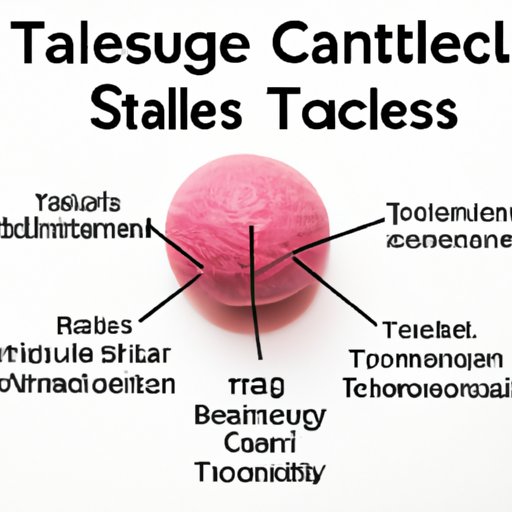
I. Introduction
Testicular cancer is a type of cancer that affects the testicles, which are located in the scrotum. It occurs when abnormal cells begin to grow uncontrollably in one or both testicles. Testicular cancer is a serious health concern that can impact individuals physically, emotionally, and socially. In this article, we will explore the causes and risks of testicular cancer, symptoms to watch for, prevention strategies and risk reduction, genetics and susceptibility, common myths and misconceptions, the link between testicular cancer and testosterone supplements, and coping strategies for treatment and recovery.
II. The Causes and Risks of Testicular Cancer: Understanding the Science behind the Disease
The exact cause of testicular cancer is unknown, but scientists believe it develops when the DNA in a testicle cell is damaged. This damage can cause the cell to mutate and grow out of control, causing a tumor. A variety of risk factors can increase the likelihood of developing testicular cancer, including age, family history, and ethnicity. Testicular cancer is most commonly diagnosed in males between the ages of 15 and 35, but it can occur at any age. Individuals who have a family history of testicular cancer or have previously had testicular cancer are also at an increased risk. Additionally, males of white or Hispanic ethnicity are more likely to develop testicular cancer compared to those of African or Asian descent.
III. Symptoms to Watch for: Early Detection of Testicular Cancer
It is essential to detect testicular cancer early to ensure the most successful treatment outcomes. Symptoms of testicular cancer may include swelling, lumps, discomfort or pain, and a feeling of heaviness in the scrotum. In some cases, individuals may also experience breast growth or tenderness due to hormonal changes caused by the cancer. It is important to perform regular self-examinations and seek medical attention promptly if you experience any of these symptoms or notice any changes in your testicles.
IV. Can Testicular Cancer Be Prevented? Lifestyle Choices and Risk Reduction
In many cases, testicular cancer cannot be prevented entirely, but there are lifestyle choices and risk reduction strategies that individuals can implement to reduce their chances of developing the disease. Maintaining a healthy weight, avoiding tobacco and excess alcohol consumption, and performing self-examinations regularly can help reduce the risk of developing testicular cancer. Additionally, regular check-ups with a healthcare provider can aid in the early detection and prevention of testicular cancer.
V. Age, Genetics, and Testicular Cancer: Factors that Increase Your Susceptibility
Age and genetics can also play a role in an individual’s susceptibility to testicular cancer. Males between the ages of 15 and 35 and those with a family history of testicular cancer are at an increased risk of developing the disease. Certain genetic mutations can also increase the risk of testicular cancer, including mutations in the genes BRCA1 and BRCA2.
VI. Misconceptions and Fact-Checking: Debunking Common Myths about Testicular Cancer
There are many myths and misconceptions surrounding testicular cancer, which can prevent individuals from seeking the medical attention they need. One common myth is that testicular cancer only affects older men, when in reality, it is most commonly diagnosed in younger males. Other misconceptions include the belief that testicular cancer is always fatal, and that there is nothing that can be done to prevent it. Dispelling these myths and providing accurate information is essential to increase awareness and encourage individuals to prioritize their health and seek regular check-ups and screenings.
VII. Investigating the Link between Testicular Cancer and Testosterone Supplements
There have been studies investigating the potential link between testosterone supplements and testicular cancer, but the evidence is inconclusive. It is recommended that individuals taking testosterone supplements discuss the risks and benefits with their healthcare provider to determine the best course of action and potential cancer risk.
VIII. Coping with Testicular Cancer: Strategies for Treatment and Recovery
There are various treatment options for testicular cancer, including surgery, radiation, and chemotherapy. Coping with the emotional and physical effects of testicular cancer can be challenging, but support groups and self-care techniques can help individuals manage the impact of the disease on their everyday lives. It is important for individuals to prioritize their mental and physical health during treatment and focus on their recovery.
IX. Conclusion
Testicular cancer is a serious health concern that can impact individuals in numerous ways. Understanding the causes and risks, symptoms to watch for, prevention strategies and risk reduction, genetics and susceptibility, common myths and misconceptions, the link between testicular cancer and testosterone supplements, and coping strategies for treatment and recovery is essential for individuals to prioritize their health and seek regular check-ups and screenings.




